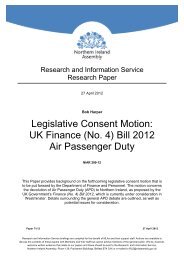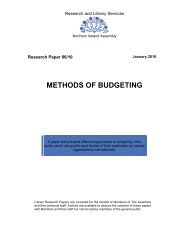Written Answers to Questions - Northern Ireland Assembly
Written Answers to Questions - Northern Ireland Assembly
Written Answers to Questions - Northern Ireland Assembly
Create successful ePaper yourself
Turn your PDF publications into a flip-book with our unique Google optimized e-Paper software.
Friday 20 July 2012 <strong>Written</strong> <strong>Answers</strong><br />
As well as looking in detail at the causes of collisions, qualitative research is also used <strong>to</strong> inform our<br />
campaigns. Ten focus groups carried out during February highlighted pedestrians’ and drivers’ lack<br />
of consideration and regard for each other and that optimism and over-confidence result in an “it will<br />
never happen <strong>to</strong> me” attitude. The focus groups also revealed that pedestrians and drivers make the<br />
easy choice by denying their own errant behaviours and this is reinforced by a lack of interest and<br />
awareness of the relevance of the Highway Code <strong>to</strong> their decisions and how they behave on the road.<br />
These are the attitudes and behaviours which compromise pedestrians’ safety and which the new<br />
campaign therefore seeks <strong>to</strong> address.<br />
Further consideration is always required and welcome in helping improve our understanding of road<br />
safety issues, including those affecting pedestrians, and shaping new initiative and policies. Action<br />
Measure 133 of the Road Safety Strategy commits DOE <strong>to</strong> continue <strong>to</strong> moni<strong>to</strong>r and, where appropriate,<br />
carry out <strong>Northern</strong> <strong>Ireland</strong> specific research on pedestrian and cyclist behaviour with a view <strong>to</strong><br />
developing further effective interventions.<br />
I can also assure you that the Department and its partners will introduce any appropriate<br />
initiatives that arise from our research programme. Road safety partners have already considered<br />
recommendations arising from completed projects in<strong>to</strong> Deprivation and Child Pedestrian Casualties,<br />
which found a clear trend of increasing rates for all child pedestrian casualties (aged 0-15) with<br />
increasing area deprivation. This relationship is highly statistically significant and means that a child<br />
living in a most deprived area is almost 5 times more likely <strong>to</strong> be injured in a collision than a child living<br />
in a least deprived area.<br />
As a result of this work, a number of additional measures have been incorporated in<strong>to</strong> the Strategy.<br />
The Department will seek <strong>to</strong> improve practical pedestrian training for children while the Department<br />
for Regional Development will undertake a review of site conditions in the most deprived areas with<br />
the highest collisions / casualties identified in the research. From DRD’s review, PSNI will consider<br />
additional police patrols in these locations.<br />
In addition <strong>to</strong> local research, the Department maintains strong working relationships with British and<br />
Irish counterparts and works <strong>to</strong> strengthen appropriate links <strong>to</strong> access the best available research,<br />
data and guidance <strong>to</strong> support our work <strong>to</strong> improve the safety of all our road users.<br />
Planning Applications for Farm Dwellings<br />
Mr Clarke asked the Minister of the Environment, pursuant <strong>to</strong> AQW 11071/11-15, for each of the last<br />
two years, <strong>to</strong> detail how many planning applications for farm dwellings under PPS 21 have been refused<br />
due <strong>to</strong> the proposed buildings not being (i) linked; or (ii) site clustered with established groups of<br />
buildings on a farm, broken down by divisional planning office.<br />
(AQW 13089/11-15)<br />
Mr Attwood: The number of planning applications refused for ‘farm dwelling’ under PPS 21 in the last<br />
two years broken down by area office is detailed in the Table below. A <strong>to</strong>tal of 10 applications for ‘farm<br />
dwelling’ have been refused in the last two business years. Of these, four included refusal reasons<br />
which related <strong>to</strong> the proposed buildings not being (i) linked or (ii) site clustered with an established<br />
group of buildings on a farm.<br />
Table showing Number of farm dwellings refused in the last two years under PPS 21 broken down by<br />
area office.<br />
Area Planning<br />
Office<br />
Number of<br />
Applications<br />
Refused<br />
year 2010/2011 year 2011/2012<br />
Refusal Reason:<br />
Not visually<br />
linked or site<br />
clustered<br />
WA 529<br />
Number of<br />
Applications<br />
Refused<br />
Refusal Reason:<br />
Not visually<br />
linked or site<br />
clustered<br />
South Antrim 2 1 1 1






